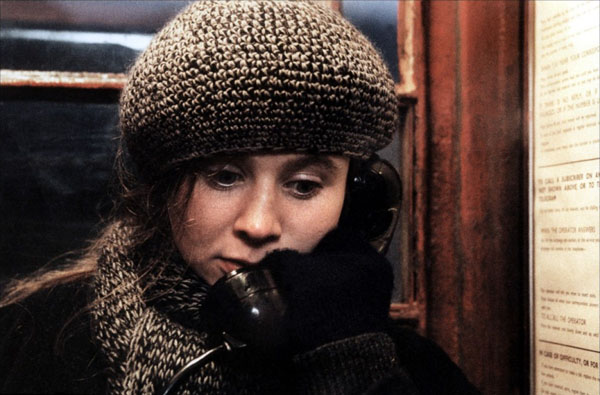“When I was little, I had a children’s book called Guldhjerte [Goldheart], which I had very clear and happy memories of,” Lars von Trier told Stig Björkman in 1999. “It was a picture book about a little girl who goes into the forest with some slices of bread and other stuff in her pockets. But at the end of the book, when she’s gotten through the forest, she’s standing there naked and with nothing left. And the last line in the book was: ‘”But at least I’m okay,” said Goldheart.’ It seemed to express the ultimate extremity of the martyr’s role. I read the book several times, in spite of the fact that my father thought it was absolute rubbish. The story of Breaking the Waves probably comes from that. Goldheart is Bess in the film.”
Criterion’s posted the interview on the occasion of its recent release of Breaking the Waves (1996) on Blu-ray and, as Gary Tooze notes at DVD Beaver, the new 4K digital restoration was supervised by von Trier himself. The film won the Grand Prix at Cannes as well as a slew of other awards elsewhere. Both Roger Ebert and Martin Scorsese placed it on their lists of the top films of the 1990s. Emily Watson was nominated for an Oscar for her portrayal of Bess McNeill and won more than a few of the other awards she was up for.
Breaking the Waves “made international stars” out of Watson and Stellan Skarsgård, “who bring off incredibly demanding roles that could easily have drowned less dazzling talents,” writes David Sterritt for Criterion. “Like such stylistic trailblazers as John Cassavetes and the French New Wave directors, von Trier put the creativity and integrity of the performances at the dead center of the production, freeing the actors to improvise and expand on his screenplay, which he regarded as a mere blueprint or outline for the picture.” He also notes that this would be the first film in von Trier’s “Golden Heart Trilogy,” to be followed by The Idiots (1998) and Dancer in the Dark (2000).
“A transitional film for von Trier, Breaking the Waves arrived just before the Danish enfant terrible chucked the stylized artifice of early films like The Element of Crime and Zentropa for the grungy tenets of his Dogme 95 movement,” writes Scott Tobias for the Dissolve. “Von Trier has since returned to the fold, but Breaking the Waves is the best of both worlds: The simplified, handheld camerawork and the idea of ‘cutting for emotion’ rather than continuity gets the most out of his actors… At the same time, though, von Trier and his great cinematographer, Robby Müller (Down By Law, Dead Man), capture the harsh, windswept beauty of the Scottish countryside in the early 1970s—a location so isolated and out of time that it’s a broken-down moped away from the 1870s or the 1770s.”
“The film’s sense of exhilaration, at its heart, derives from a simple but powerfully effective contrast,” writes Chuck Bowen for Slant. “It’s a faith-based film with an anarchist punk-rock aesthetic…. To save her husband Jan’s (Stellan Skarsgård) life, Bess must destroy herself in every sense of the word so as to render a salvation that appears to be meaningless on a grand social scale. Breaking the Waves is so irresolvable and so disturbing because it’s a romantic deconstruction of romanticism; von Trier links intense love to the domineering platitudes of traditional religious trials of faith through their mutual capacity for masochism.”
In December 1996, months after he saw Breaking the Waves at Cannes, Jonathan Rosenbaum was still “debating within myself about it, because I find it simultaneously shameless, boldly original, contrived, highly affecting, transparent, cynical, hopeful, ironic, sincere, ugly, beautiful, and downright baffling. In a way, my debate isn’t so different from that of Bess,” who “for much of the film carries on a furious internal debate with ‘God,’ speaking her own part in a squeaky high voice and God’s in a patriarchal low one. Where Bess, a devout believer, has God, I, a nonbeliever, have the late Carl Dreyer,” whose “work has direct bearing on many basic issues raised by Breaking the Waves—about film, about religion, and about the whole notion of ‘good works,’ in both ethical and aesthetic terms…. Nonetheless, the cynicism and shameless crudity of von Trier’s plot and dramaturgy make it impossible to consider him seriously alongside Dreyer…. In short, Breaking the Waves aggravates and perplexes me, proposing a critical conundrum that, I reluctantly confess, can only grow out of something new and interesting.”
For news and tips throughout the day every day, follow @KeyframeDaily. Get Keyframe Daily in your inbox by signing in at fandor.com/daily.




